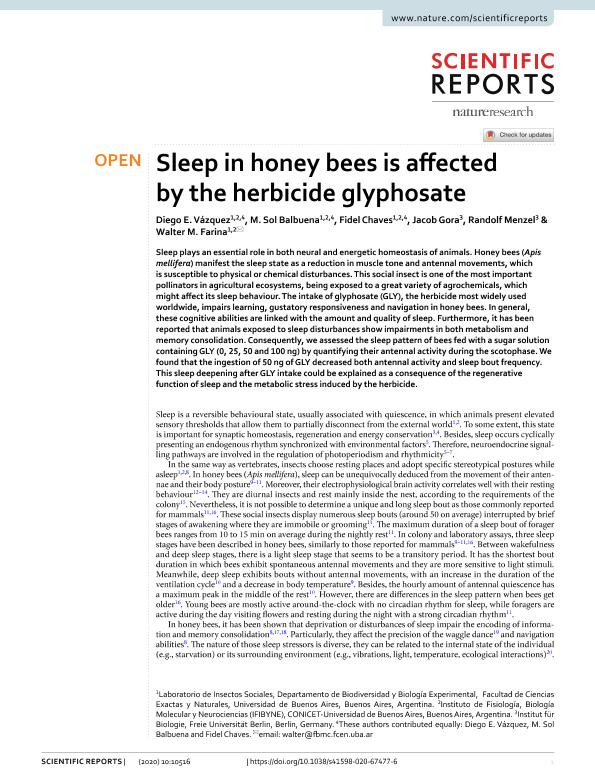Artículo
Sleep in honey bees is affected by the herbicide glyphosate
Vázquez, Diego Eduardo ; Balbuena, María Sol
; Balbuena, María Sol ; Chaves, Fidel; Gora, Jacob; Menzel, Randolf; Farina, Walter Marcelo
; Chaves, Fidel; Gora, Jacob; Menzel, Randolf; Farina, Walter Marcelo
 ; Balbuena, María Sol
; Balbuena, María Sol ; Chaves, Fidel; Gora, Jacob; Menzel, Randolf; Farina, Walter Marcelo
; Chaves, Fidel; Gora, Jacob; Menzel, Randolf; Farina, Walter Marcelo
Fecha de publicación:
12/2020
Editorial:
Nature Research
Revista:
Scientific Reports
ISSN:
2045-2322
Idioma:
Inglés
Tipo de recurso:
Artículo publicado
Clasificación temática:
Resumen
Sleep plays an essential role in both neural and energetic homeostasis of animals. Honey bees (Apis mellifera) manifest the sleep state as a reduction in muscle tone and antennal movements, which is susceptible to physical or chemical disturbances. This social insect is one of the most important pollinators in agricultural ecosystems, being exposed to a great variety of agrochemicals, which might afect its sleep behaviour. The intake of glyphosate (GLY), the herbicide most widely used worldwide, impairs learning, gustatory responsiveness and navigation in honey bees. In general, these cognitive abilities are linked with the amount and quality of sleep. Furthermore, it has been reported that animals exposed to sleep disturbances show impairments in both metabolism and memory consolidation. Consequently, we assessed the sleep pattern of bees fed with a sugar solution containing GLY (0, 25, 50 and 100 ng) by quantifying their antennal activity during the scotophase. We found that the ingestion of 50 ng of GLY decreased both antennal activity and sleep bout frequency. This sleep deepening after GLY intake could be explained as a consequence of the regenerative function of sleep and the metabolic stress induced by the herbicide.
Palabras clave:
honey bee
,
agrochemical
,
glyphosate
,
sleep
Archivos asociados
Licencia
Identificadores
Colecciones
Articulos(IFIBYNE)
Articulos de INST.DE FISIOL., BIOL.MOLECULAR Y NEUROCIENCIAS
Articulos de INST.DE FISIOL., BIOL.MOLECULAR Y NEUROCIENCIAS
Citación
Vázquez, Diego Eduardo; Balbuena, María Sol; Chaves, Fidel; Gora, Jacob; Menzel, Randolf; et al.; Sleep in honey bees is affected by the herbicide glyphosate; Nature Research; Scientific Reports; 10; 1; 12-2020; 1-8
Compartir
Altmétricas



